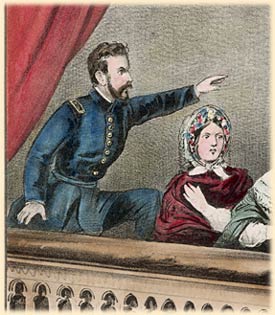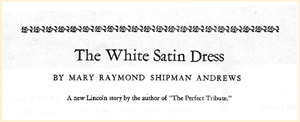
Clara and Henry Rathbone were married two years after Lincoln's assassination. Henry blamed himself for Lincoln's death and became increasingly despondent.
Although decorated for his Civil War bravery, Henry began suffering from constant fears, nervous headaches, and a variety of physical ailments. He toured Europe with Clara, seeking the help of European doctors and spas, but was tormented by paranoia and delusions. On Christmas Eve 1883, Henry Rathbone murdered Clara, convinced that she was plotting to abandon him, and then tried to take his own life. Although he survived, Rathbone was confined to an insane asylum until his death.


There is no reliable description of the dress Clara Harris wore to Ford's Theatre on the night of the assassination.
Author Mary Shipman Andrews described it as a "white satin ball-dress, with a wreath of artificial roses and lilacs across the front" in her 1929 ghost story. (ANDREWS) Women's 1865 evening attire could have been either short- or long-sleeved. The lightweight white silk fragment is similar to inexpensive silks frequently used as sleeve linings.
Women's evening gowns, detail from Frank Leslie's Lady's Magazine, December 1864 (ICHi-30950).


In the summer Clara Harris went to her family's little summer house just outside Albany, taking her dress along. It was inconceivable for her to have it cleaned up for use, yet she could not bring herself to burn it or throw it away. She put it in a closet. It was hanging there one year to the day from the assassination when she awoke in the night, she told her family, to the sound of low laughter. She said it had been Lincoln, enjoying the play he was watching when Booth's bullet struck. Only a dream, people told her. But a year later, it was said, a guest sleeping in the room came to breakfast with the same story... In 1910, a year before his mad father's death, Representative Rathbone [Clara and Henry's son], so Albany papers said, broke down the bricks walling in his mother's dress last worn forty-five years earlier and burned it, saying it had cursed his family. (SMITH, "The Haunted Major")
